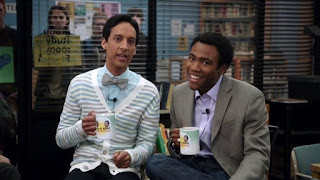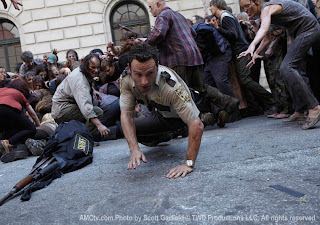101 Things I Loved About TV This Year
Unfortunately I haven't gotten my top 10 shows list done yet, so in the mean time, here is a list of the 101 Things on TV I loved this year. They can be anything from a specific moment to an episode or story arc.
Yes some of the videos are in reverse. I don't know why.
South Park South Park
Troy
24: Jack ambushing Logan
30 Rock: Tracy Jordan’s bloopers from his Boys and Girls Club PSA
30 Rock: Alec Baldwin, still one of the most dependable actors on TV
Breaking Bad: Proof that showrunners shouldn’t be afraid of making it up as they go along (so long as the writers are on the level of Breaking Bad’s)
Breaking Bad: The best cold opens on TV
Breaking Bad: The rest of the episodes were pretty astounding too
Breaking Bad: Bryan Cranston winning Best Actor at the Emmys for the third year straight and Aaron Paul getting his due
Breaking Bad: The climax of “One Minute” (capping off what may be their best episode, NSFW)
Breaking Bad: “Half Measures”
Chuck: “Chuck Vs. The Beard”
Community & Parks and Recreation: Seeing these two shows’ ensembles gel into two of the best comedic casts on TV
Community: “Modern Warfare”
Community: The “Layla” montage in “Contemporary American Poultry”
Community: “Abed’s Uncontrollable Christmas” Watch episode on Hulu.
Community: That they had a subplot occur solely in the background in the “The Psychology of Letting Go”
Conan O’Brien: His farewell speech on The Tonight Show
Connie Britton and Kyle Chandler finally getting some Emmy love
Daria: Finally out on DVD
Doctor Who: The touching end to “Vincent and the Doctor”
Doctor Who: Using time travel for a clever spin on “A Christmas Carol”
Doctor Who: The smooth transition from the Tennant/Davies era to the Smith/Moffat one
Friday Night Lights: Realizing how much Tim Riggins has grown from the first season
Friday Night Lights: Seeing Michael B. Jordan on another great show
Friday Night Lights: That they were able to move on with a new cast of high school characters rather than shoehorning the old ones in unrealistic ways
Friday Night Lights: Zach Gilford delivering a devastating performance in “The Son”
Friday Night Lights: Buddy Garrity standing up to the arrogant Dillon Panther boosters
Fringe: Seeing Anna Torv blossom into a really talented actress
Fringe: Seeing John Noble continue to make Walter Bishop one of TV’s most fascinating characters
Fringe: The attention to detail in making every difference between “Over Here” and “Over There” even more special
Fringe: The alternate opening title sequences
glee: Burt Hummel, one of the best TV dads on now
glee: Kurt singing “I Wanna Hold Your Hand”
glee: The “Bohemian Rhapsody” sequence
HolyMauryMotherofGod.Tumblr.com
How I Met Your Mother: “Natural History”
How I Met Your Mother: The creative rebound of the sixth season
How I Met Your Mother: The “Nothing Suits Me Like a Suit” song
It’s Always Sunny in Philadelphia
Jeff Zucker’s Reign of Terror at NBC coming to an end
Jimmy Kimmel calling out Leno on his nonsense
Justified: The writing cartwheels they took to keep Walton Goggins around
Live Tweeting Awards shows
Lost: Jack’s epic jumping punch
Lost: The final scene
Lost: The moments of realization when the characters connected in the flash sideways, in particular Charlie, Kate & Claire and Juliet & Sawyer
Louie & Party Down: Proof that you can make something great even on a microscopic budget
Louie: The heckler throw down (NSFW)
Mad Men: How Kiernan Shipka went from a non-entity in season one to a fully realized character now
Mad Men: The art design of Sterling-Cooper-Draper-Pryce
Mad Men: The shot of Peggy riding the bicycle in the empty studio
Mad Men: That Betty Draper’s role was significantly reduced this year
Netflix: The continued expansion of their “Watch Instant” library
Parks and Recreation: Ron Swanson. Enough said.
Party Down: “Steve Guttenberg’s Birthday”
Party Down: Kyle’s band Karma Rocket unfortunate song choice for a Jewish wedding (NSFWish)
Saturday Night Live: “I Just Had Sex”, the best digital short since “Motherlover” (NSFW, but not as much as some of the videos here)
Saturday Night Live: Kanye West’s performance of “Power”
Saturday Night Live: Backlash be damned, Betty White hosting
Supernatural: The Winchester
Supernatural: Bobby, the guy you want having your back
Supernatural: The classic rock soundtrack
Terriers: That killer theme song
Terriers: “Quid Pro Quo”
The Good Guys: The nerdy lab tech Samantha
The In-Betweeners: Jay’s foul mouth (Very NSFW)
The In-Betweeners: “Thorpe Park
The Office: The writers keeping Jim and Pam together
The Office: Andy’s disastrous Sweeney Todd performance
The Simpsons: The controversial opening designed by Banksy
The Venture Bros.: Hank going film noir in “Everybody Comes to Hank’s”
The Venture Bros.: Henchman 21’s character arc
The Venture Bros.: Steven Rattazzi’s line reading as Dr. Orpheus (below is th music usually accompanying the more dramatic quotes).
The Venture Bros.: The multiple interpretations of what a “Rusty Venture” is (way, way, way, NSFW)
The Venture Bros.: “Operation: P.R.O.M.”
The Walking Dead: One of the best pilots in years
The week of May 2-May 8
The shows I caught up with or am catching up with
Avatar: The Last Airbender
Community
Doctor Who
House
How I Met Your Mother
Parks and Recreation
Sons of Anarchy
Supernatural
The Venture Bros.
Non-romantic pairs:
Sam and Dean (Supernatural)
The Doctor and Amy (Doctor Who)
Walter and Jesse (Breaking Bad)
Don and Peggy (Mad Men)
Britt and Hank (Terriers)
Pete White and Billy Quizboy (Venture Bros.)
Romantic pairs:
Henry and Casey (Party Down)
Eric and Tami (Friday Night Lights)
Marshall and Lily (How I Met Your Mother)
Britt and Katie (Terriers)
The Monarch and Dr. Mrs. The Monarch (Venture Bros.)
Jim and Pam (The Office)
Liz and Jack (The Good Guys)










